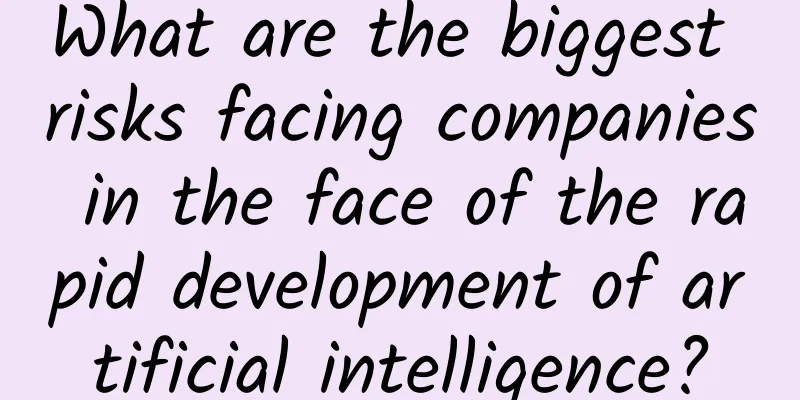What are the biggest risks facing companies in the face of the rapid development of artificial intelligence?

The World Economic Forum’s Global Risks Outlook Survey, which surveyed chief risk officers ( CROs ) from large companies and international organizations , found that artificial intelligence ( AI ) has the potential to bring significant benefits to business and society, but also has the potential to cause significant damage if we do not understand the risks posed by the technology. The survey, detailed in the forum’s mid-year Chief Risk Officers Outlook, warns that risk management with AI has not kept pace with rapid advances in the technology. Three-quarters of CROs surveyed said the use of AI poses reputational risk to their organizations, while nine in ten said more needs to be done to regulate the development and use of AI. Nearly half favour pausing or slowing the development of new AI technologies until we can better understand their risks. AI “ creates a complex and uncertain environment in which organisations operate, ” the report said . “ Discussions about technology-related risks have increased dramatically in recent months, particularly in light of exponential advances in and interest in generative AI. ” Big benefits and big damage The report said that while AI technology has the potential to bring " significant benefits " in areas such as agriculture, education and healthcare , " it can also cause great disruption . " One of the biggest risks identified by CROs is the malicious use of AI. Because it is easy to use, generative AI technology could be misused by some to spread false information, conduct cyberattacks, or obtain sensitive personal data. A significant risk of AI comes from its " opaque inner workings " . The report says no one fully understands how AI content is produced. This further highlights the risks pointed out by chief risk officers that we may inadvertently share personal data and suffer from biased decision-making based on AI algorithms. How chief risk officers view the risks posed by the rapid rise of artificial intelligence. Image: World Economic Forum The report also said that due to the lack of understanding of how AI works, it is difficult to predict its future risks. However, CROs said the business areas most affected by AI are operations, business models and strategy. All respondents agreed that AI is advancing faster than its potential ethical and societal risks can be managed, and 43% said the development of new AI technologies should be paused or slowed until their potential impacts are better understood. Regulating the development of artificial intelligence More than half of CROs said they understand the impact that technology regulation could have on their organizations, and 90% said regulation of AI development needs to accelerate. More than half of CROs plan to review AI technologies in use at their organizations to assess their security, legality and “ ethical compliance , ” but some CROs say senior management is reluctant to view AI as a business risk. Peter Giger , chief risk officer at Zurich Insurance Group and co-author of the CRO Outlook report , said we cannot ignore the risks of AI, but companies need to take a broader, longer-term approach. Giger said: “ Focusing too much and too narrowly on the risks that are likely to dominate over the next six months or so can easily distract us from addressing the big risks that lie ahead. “ Artificial intelligence is a great example because it requires us to think long-term. Will AI disrupt everyone’s life today? Probably not. For many of us, it’s not an immediate threat. But you can’t ignore the impact and trends that AI will have over time. ” How to use artificial intelligence responsibly In June this year , the forum released a white paper on recommendations for the responsible development of artificial intelligence, urging technology developers to increase openness and transparency and use more accurate and shared terminology. The guidelines also call on the technology industry to make more efforts to raise public awareness of the capabilities and limitations of artificial intelligence, and to give more consideration to social concerns and user feedback in order to build industry trust. More information about the Global Risks Outlook Survey The Global Risks Outlook Survey was conducted among the Forum’s Chief Risk Officer Group, which is comprised of risk professionals from a broad range of multinational companies in sectors including technology, financial services, healthcare, professional services and industrial manufacturing. Respondents believe that in addition to artificial intelligence, macroeconomic conditions, pricing and supply disruptions of key raw materials, armed conflicts and regulatory changes are also issues of greatest concern to companies. Author of this article: Douglas Broom , Senior Writer, Forum Agenda This article originally appeared on the World Economic Forum's Agenda blog |
<<: Nvidia accuses Qualcomm and Samsung of infringing its graphics processing technology patents
>>: Aion's globalization dominated CCTV screens for 6 times at the Beijing Auto Show
Recommend
Dan Nystedt: Nvidia will contribute 11% of TSMC's revenue in 2023
According to financial expert Dan Nystedt's f...
Learn how to operate the entire business from Li Jiaqi
What is your impression of Li Jiaqi? ——The No. 1 ...
How much does it cost to customize a photography app in Taizhou?
Taizhou photography applet customized price 1. Di...
New weapon against cancer! China Spallation Neutron Source: making the microscopic world “visible”
From "a piece of paper plan" to the cre...
Lenovo is once again making efforts in smart TV. What are the chances of the PC industry giant making a comeback against the trend?
After experiencing a series of events that have l...
Android application source code custom controls
Functional classification: Tools Supported platfo...
How to promote an H5 event with 10W+PV?
——How to operate an event with little money and l...
Cheating your money + ruining your eyes! Whoever buys a wide color gamut TV will regret it
In our lives, color can be said to be the most em...
Fan Jian Taobao Tmall Courses - Business Advisor Data Analysis Courses (Advanced) to help you run your store easily
Fan Jian Taobao Tmall Courses - Business Advisor ...
Six steps for Xiaohongshu UP masters to make money. Even novices can earn more than 5,000 yuan a month by mastering the methods
The core significance of the Xiaohongshu APP: Xia...
What kind of new users is Zhihu targeting with its World Cup “brainwashing advertisement”?
During the World Cup , the brainwashing commercia...
How to make 100,000 RMB a month with Douyin local food accounts
I think many people thought when they were young ...









